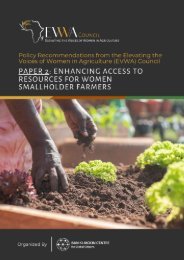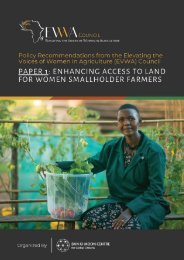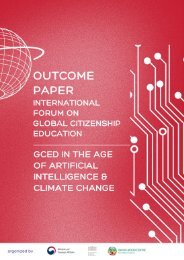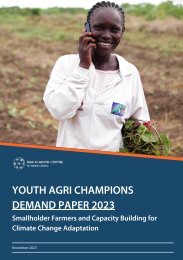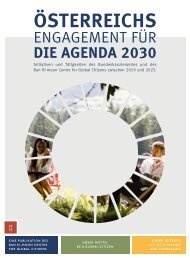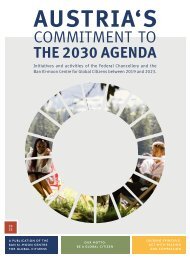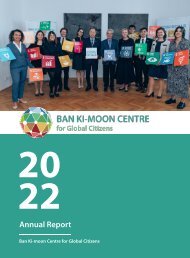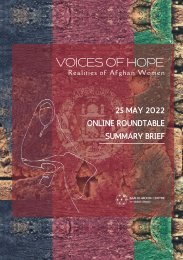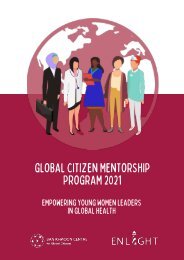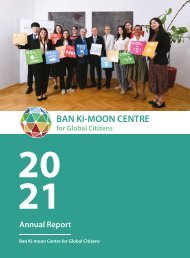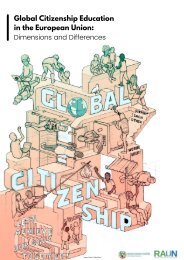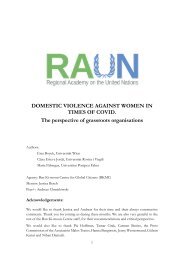Europe and North America Regional GCED Network
The report “Europe and North America Regional GCED Network” is based on a research project funded by Asia-Pacific Centre of Education for International Understanding (APCEIU) and Ban Ki-moon Centre for Global Citizens (BKMC) led by Lynette Shultz (Centre for Global Citizenship Education and Research, University of Alberta) and Massimiliano Tarozzi (International Research Centre on Global Citizenship Education, University of Bologna) as Principal Investigators. The research team was composed of Carrie Karsgaard and Carla Inguaggiato, with the support of Kester Muller and Francis Owusu.
The report “Europe and North America Regional GCED Network” is based on a research project funded by Asia-Pacific Centre of Education for International Understanding (APCEIU) and Ban Ki-moon Centre for Global Citizens (BKMC) led by Lynette Shultz (Centre for Global Citizenship Education and Research, University of Alberta) and Massimiliano Tarozzi (International Research Centre on Global Citizenship Education, University of Bologna) as Principal Investigators. The research team was composed of Carrie Karsgaard and Carla Inguaggiato, with the support of Kester Muller and Francis Owusu.
Create successful ePaper yourself
Turn your PDF publications into a flip-book with our unique Google optimized e-Paper software.
foundation for global relations (Pashby et al., 2020).<br />
Liberal <strong>GCED</strong> interfaces with neoliberal orientations particularly emphasising<br />
individual rights <strong>and</strong> competencies within a global system. Drawing particularly<br />
on the work of Oxley <strong>and</strong> Morris (2013), Pashby <strong>and</strong> colleagues (2020) show<br />
that while liberal orientations promote an ethical stance towards "others" <strong>and</strong> a<br />
critique of western cultural dominance, in some cases, the ultimate onus is on<br />
the "individual to become more culturally competent rather than on significant,<br />
systemic changes to the status quo" (p. 152). Further, they point out that liberal<br />
orientations stop short of exploring onto-epistemic possibilities beyond a<br />
modern/colonial imaginary, including how this pervasive imaginary might be<br />
informing critiques of western dominance.<br />
Critical<br />
We thus turn, therefore, to critical <strong>GCED</strong> orientations, which Pashby <strong>and</strong><br />
colleagues (2020) have shown to be the most internally diverse category.<br />
Broadly, critical orientations acknowledge <strong>and</strong> seek to address social<br />
injustices (Tarozzi & Torres, 2016; Tarozzi, 2021). In efforts to reverse the<br />
legacy of colonialism, much critical <strong>GCED</strong> thus questions hegemonic<br />
"structures, systems, assumptions, power relations <strong>and</strong> attitudes that create<br />
<strong>and</strong> maintain exploitation <strong>and</strong> enforced disempowerment" (Andreotti, 2014,<br />
p. 6), providing opportunities for students to face their complicity in injustice<br />
<strong>and</strong> acknowledge the contextual <strong>and</strong> historical nature of their knowledge <strong>and</strong><br />
identities (cf. Andreotti & de Souza, 2008) <strong>and</strong> how such knowledge shapes<br />
their engagement with people in other positions. Some critical expressions<br />
are particularly anti- or decolonial, taking active steps to expose the epistemic<br />
violence of colonialism, which creates an abyss (de Sousa Santos, 2007)<br />
between those who are constructed as knowable, inferior, or undeveloped<br />
<strong>and</strong> those who set the terms of knowability according to western norms.<br />
By encouraging students to "challenge dominant ideologies, disassemble<br />
hierarchies of power, <strong>and</strong> question curricula <strong>and</strong> pedagogy" (Lapayese, 2003,<br />
p. 500), much critical <strong>GCED</strong> is transformational, seeking to establish "new ways<br />
of negotiating between local <strong>and</strong> global actions <strong>and</strong> agenda, resolving conflict,<br />
<strong>and</strong> acting in solidarity" (Shultz, qt. in Pashby, 2009, p. 61). At the same time,<br />
Pashby <strong>and</strong> colleagues indicate a number of interfaces between critical <strong>and</strong><br />
liberal orientations, according to the extent to which each position "offer[s] an<br />
alternative to extant structures, systems, <strong>and</strong> subjectivities (more critical) or<br />
more strongly align[s] with universal morally liberal commitments (more liberal"<br />
(Pashby et al., 2020, p. 156). Due to the interfaces between these two more<br />
prevalent <strong>GCED</strong> orientations, we use our analysis to explore their overlaps <strong>and</strong><br />
divergences among the networks.<br />
As our research is situated in the Global <strong>North</strong>, we are also interested in the<br />
presence or absence of what Pashby et al. (2020) drawing on Stein (2015)<br />
<strong>and</strong> Andreotti (2014) to term critical-postcritical <strong>GCED</strong> - an expression that is<br />
rarely found in practice in the Global <strong>North</strong> <strong>and</strong> in fact may be "unimaginable<br />
018ㆍ 019




